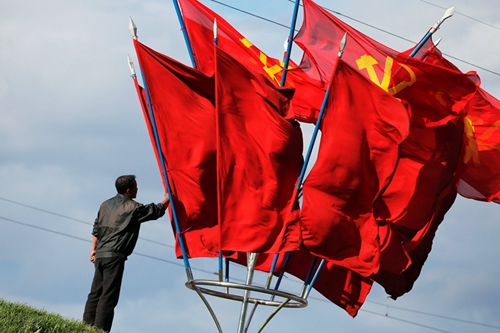By Gao Haorong, Researcher of Center for World Affairs Studies, Xinhua News Agency
The 7th Congress of Korean Workers Party of the DPRK (Democratic People's Republic of Korea) opened in Pyongyang on May 6. Kim Jong-un, first secretary of KWP (Korean Workers Party), delivered a work report to the Party's Central Committee.

On May 8, Pyongyang's official media published the full text of the report, which reviewed KWP's work in the last 36 years, and highlighted its future objectives.
Kim summarized the nation's major achievements in the past 36 years and defended the DPRK as a power state in politics, ideology, military, and nuclear power.
The KWP has suffered a tough time since the 6th KWP Congress met in October 1980. The DPRK has lost two leaders, endured a global anti-socialist campaign and faced political and military pressures and economic blockades conducted by the United States and its allies.
The people of DPRK have dealt with natural disasters. Moreover, Pyongyang's national security and its socialism fate stood in danger, and the people of the DPRK had strived with the difficulties and marched forward.
Kim stressed that despite difficulties, the KWP maintained its military-first politics to guide the revolution.
Military-first politics is a sword for the KWP and people to overcome obstacles. The world is suffering from continuous wars and many people feel anxious. However, in the past few decades, there had been no war on the Korean Peninsula.
Peoples in his country are not wealthy but enjoy a stable life. Former DPRK leaders Kim Il Sung and Kim Jong Il supported military-first politics. Pyongyang stands determined to keep the status quo.
The DPRK priorities are to fulfill the Kim Il Sung - Kim Jong Il doctrine in the fields of politics, military, economy and culture. The DPRK will implement the long-standing policy of ideological, technical and cultural revolutions to strengthen the people's power and self-renewal as the first doctrine.
The DPRK will build a technology power and a five-year national economic development strategy (2016-2020) for the nation to emerge as a developed country.
Kim proposed to increase national investment in science and technology to cultivate talented persons, increase technology researchers to more than three times the current figures. He emphasized developing space science and technology, and to manufacture and launch more satellites.
The United Nations sanctions resolutions restrict Pyongyang from launching satellites into orbit. But Kim disagrees with the sanctions. That's a signal the DPRK will dispute the international community on this matter.
Kim's report is a breakthrough for its national economy. The strategy is to invigorate its national economy, achieving a balance between economic sectors for sustainable development. Pyongyang hopes to improve people's livelihood.
Kim's call for "Reunification of the Motherland" was a key point for the 7th KWP Congress. He supports the federalism plan proposed by Kim Il Sung at the 6th Congress with an emphasis on an independent unity.
He said reunification does not require approval from others, nor relies on others for help. Kim wants to improve relations between the DPRK and South Korea.
Kim said, to improve relations, both sides should respect each other. The current tense state of DPRK-South Korea relations could be resolved through dialogue.
Kim proposed to hold consultations between military authorities of both sides. Yet, his request was rejected by the South Korean Unification Ministry spokesman on May 8. The spokesman argued that the DPRK must first halt its ongoing nuclear development and provocations. It could be predicted that under the current situation, it's impossible for both sides to hold dialogues very soon. So there will be a long way to go for the two sides to ease the tension on the Korean Peninsula.
Kim mentioned the nuclear issue in a chapter on independence in the world. He said that as long as the nuclear threat and arbitrariness of imperialism continues, Pyongyang will strengthen its nuclear forces for self-defense purposes.
He claimed the DPRK is a responsible nuclear state. If hostile forces do not violate the autonomy of his country, Pyongyang would not launch pre-emptive strikes of nuclear weapons.
Pyongyang would fulfill its commitments to global denuclearization. Pyongyang has reinvented itself as a nuclear power with no plans to abandon them.
Pyongyang will carry out foreign relations as an independent power with nuclear weapons. Pyongyang's diplomatic departments should support the principles of independence and a nuclear statehood in foreign affairs activities.
The goal of denuclearization of the Korean Peninsula seems unlikely. UN Security Council sanctions have not shaken Pyongyang's resolve to develop nuclear weapons.
In the final section of the report, Kim plans to establish the party's leadership under unanimous revolutionary discipline overseen by the KWP. All works shall be organized under the KWP Central Committee.
The people-first doctrine would be implemented. Overbearing manners of bureaucrats and corruption are intolerable. He acknowledged shortcomings in the course of the revolution and aims to make people realize the KWP will move forward.
The opening of the 7th Congress of Korean Workers Party indicates the party's strengthening role. Kim has set tone for the DPRK’s future. Pyongyang will follow up on the established route and develop in its own way.
( The opinions expressed here do not necessarily reflect the opinions of Panview or CCTV.com. )

Panview offers an alternative angle on China and the rest of the world through the analyses and opinions of experts. We also welcome outside submissions, so feel free to send in your own editorials to "globalopinion@vip.cntv.cn" for consideration.















